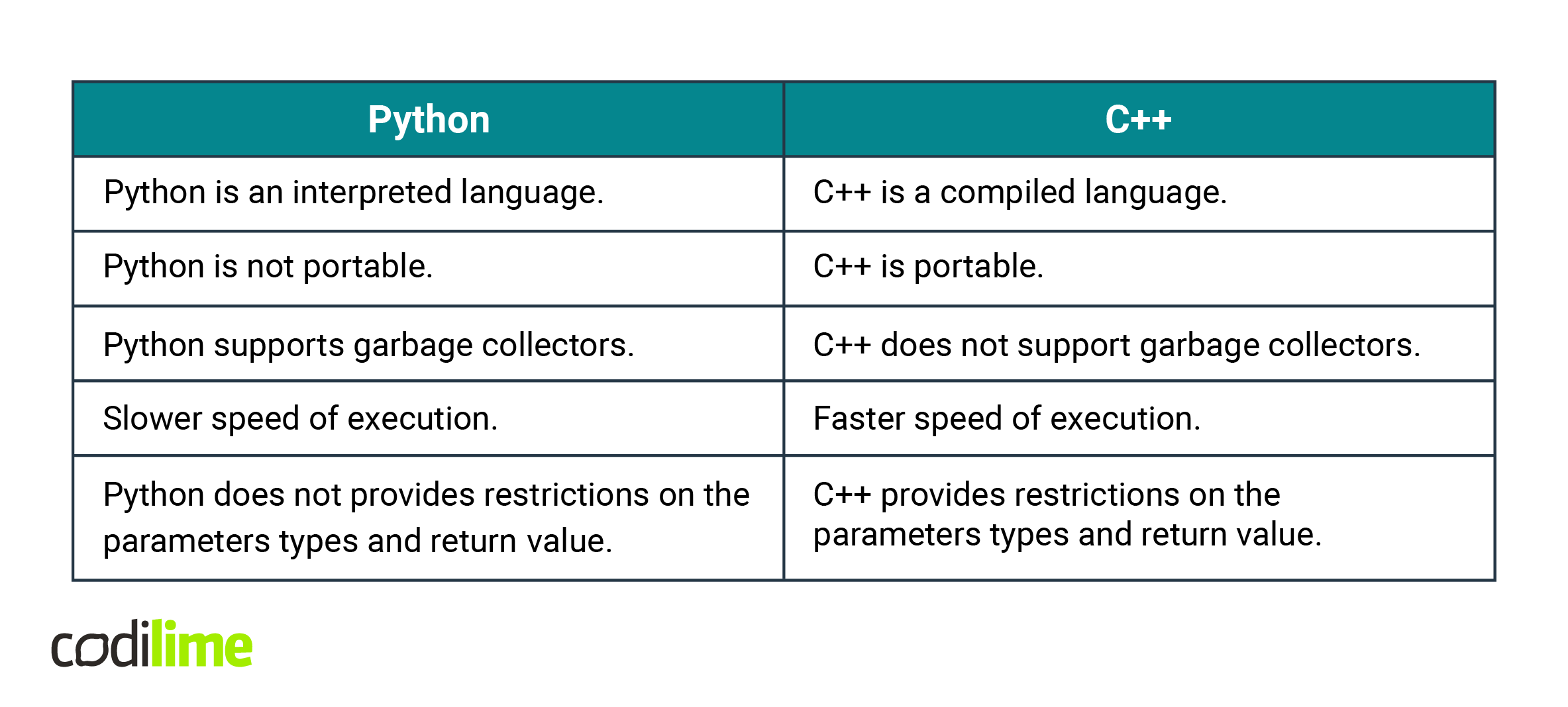Python and C++ are legends among programming languages. There is probably no IT specialist who has not heard about these technologies. Their popularity translates to an immense number of sources for Python and C++. There are so many of them that it can be challenging to choose the essential information.
From this article, you will learn more about how Python and C++ are different from each other. In what cases are they the go-to technology to boost a project? And in which cases do they not work out? The answers to these questions are right below.
What is Python?
Python’s history is connected to one main name – Guido van Rossum. He is the principal author of this project. Thanks to his determination, in 1994, Python was ready with its first version – Python 1.0.
Currently, Python is one of the most popular programming languages in the developers' survey – even going back five years or more, this language had one of the leading places in the ranking.
If you want to know more about Python, also check out the articles: what is Python used for and why Python is so popular.
What is C++?
C++ is a bit older than Python – it was released in 1985 by Bjarne Stroustrup. It is an extension of the C language, and that is why it is often called “C with Classes”.
Nowadays, C++ is not as popular among the developers’ community as Python. However, that does not mean that this language is out of date. After all these years, there are still fields where C++ is an impregnable king.
Python and C++ possible usages
Both programming languages can boast of a wide range of business sectors where they are go-to technologies for various project types. Below are the most common Python and C++ usages.
For what projects is Python the best choice?
- Artificial intelligence (AI) and machine learning (ML) – Python is often associated with AI and ML projects. The reason why this programming language is commonly chosen is simple. Python provides many libraries and packages dedicated to both machine learning and artificial intelligence challenges and requirements.
- Data analytics and visualization – The Python language offers libraries dedicated to this purpose, as well as graphs, charts and histograms.
- Web development – Django, Pyramid, Flask – these names sure sound familiar. These frameworks are wildly popular among developers as solutions that make web development easier.
- Automation – Python helps both with saving time otherwise wasted on running repetitive tasks and finding possible bugs thanks to automated tests. At CodiLime, we really enjoy using Python for automation. Check out our Python development services to get the details on how we use this language in these kinds of projects.
This is only a sneak peek of what Python is used for – read the previous article to learn more.
For what projects is C++ used?
- Game development – C++ provides a lot of frameworks specifically for game development, and it is still the main language in this field. However, Rust is breathing down C++’s neck and is trying to replace it. Theres also a lot of competition between C++ vs Rust.
- Embedded systems – C++ is used for software that runs on constrained devices or firmware as a technology that can work close to the hardware.
- Cloud systems – these solutions are demanding. They often have to work close to the hardware and require multithreading. C++ meets these needs, which makes it a popular choice for these types of projects.
How do the differences between these two programming languages look in detail? Below you will find more details about Python and C++ features, speed, advantages, and when they are not the best choice for a project.
We are a C++ development services company – check how we can support you.
Python vs. C++ – comparison
Python and C++ have something in common – they are both general-purpose programming languages, which means they were not created to resolve any predefined problem. Thanks to that, they can be used in various fields, as shown in the section above, and that accounts for their popularity.
However, despite being general purpose, Python and C++ are chosen by developers for different projects. Why? Let’s look at these programming languages in detail to understand why they are appropriate for different challenges.
Python and C++ features
Python is described as a high-level, procedural, interpreted, object-oriented language with dynamic semantics. It combines dynamic typing and dynamic binding, and consists of built-in data structures.
The C++ language is object-oriented, procedural, and imperative. It mixes both high- and low-level language features which allows for manipulating memory at a low-level. Interesting fact – many Python libraries are based on C++ code.
Major differences between Python and C++:

Speed and performance of Python and C++
It is no secret – Python is not the fastest language that you could imagine. The interpreter slows it down.
C++ is famous for its speed. There is no real competition among any other comparable language – C++ will almost always need less time to execute a specific task. However, the difference between Python and C++ is huge.
How does the speed comparison of these languages look in numbers? Check out our previous comparison of Go vs. C++ for details.
Python vs. C++ – exception handling
There are types of errors that are more probable than others while coding. The first of them is syntax errors. Syntax errors occur when there is a mistake in the structure or statement in the code – the easiest solution is to find a miswriting line and fix it. The more complicated are logic errors that can lead to runtime errors, called exceptions.
An exception is a condition occurring during program execution that requires dedicated processing. Exception handling is simply the process of responding to such occurrences. How do Python and C++ fare?
Python allows for managing exceptions in two different ways: by using try, except and finally statements; or by assertions that can be turned on and off whenever the testing of the program is finished.
C++ also provides three keywords that help with exception handling – throw, try, and catch.
Both Python and C++ do a good job of exception handling. Everything depends on the application needs.
Go provides a slightly different solution for managing the exceptions – in our Go vs. Python article, you can find more about the Go language proposition.
Is Python or C++ easier to learn?
Python is unequivocally the easier language to learn, with smaller entry barriers when it comes to the learning curve. Its syntax consists of many English words, which makes it easy to understand and learn for entry-level developers. However, the syntax changes with each new Python version, so Python’s users have to be aware and keep track of modifications.
C++ is a more complex and not so developer-friendly language. It has more predefined syntax rules and program conventions. In the beginning, C++ will definitely have a steeper learning curve but, as with Python, C++ has a lot of tutorials, guides, and an active community on board. There is a great likelihood that any issue already has a clearly described solution, which can repay the effort.
Both programming languages have significant communities that work on maintenance and developing new libraries and frameworks. It does not matter if we are talking about Python or C++. In both cases, there are many free sources that facilitate the learning process and developers (both junior and more experienced) can count on community support.
Python vs. C++ – advantages and disadvantages
There is no one solution that will work equally well no matter the project type. There is nothing wrong with that – every technology has its pros and cons. It is only important to be aware of them to make the best decision and choose wisely the language that fulfills your project needs.
In the tables below you will find the most important Python and C++ advantages and disadvantages.
Python advantages and disadvantages
Python advantages:
- Simple, clean syntax.
- A variety of available tools and libraries.
- Easy to learn and understand.
- Free and open-source solution.
Python disadvantages:
- High memory consumption – Python is not the best choice for memory-intensive tasks.
- Poorly adjusted for mobile development.
- Slower speed compared to compiled programming languages.
- Requires more testing as a dynamically typed language – some errors occur only at runtime.
C++ advantages and disadvantages
C++ advantages:
- Great performance and efficiency.
- Portability – C++ works on almost every platform, including embedded systems.
- Can work close to the hardware.
- Allows peripheral hardware to access RAM bypassing the CPU - Dynamic Memory Allocation.
C++ disadvantages:
- No garbage collection forces developers to manage the memory on their own.
- Poor flexibility due to strict syntax.
- C++ is sometimes pointed out as a language with security vulnerabilities.
- C++ is one of the most complex and difficult languages to learn with a steep learning curve.
Conclusion
Python and C++ have a strong body of vocal believers. Both these languages are veterans on the market and have had a chance to shape themselves over the years. Now, Python and C++ are so extensive that it is impossible to cover every aspect in just one article – to show how broad this topic is, you can check out what the Python guide and C++ tutorial
for beginners look like.
This article aims to make it easier to understand the major differences between Python and C++ and point out when each of them works the best. Hopefully, this brief comparison helps you choose the technology that meets your needs and helps you and your team create another outstanding product.








